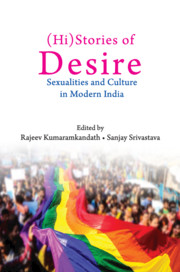Book contents
- Frontmatter
- Contents
- List of Images
- Acknowledgements
- Introduction: Sexuality and Sexualities
- 1 Politics of Prop Roots: Beyond ‘The Repressive Hypothesis’
- 2 Of Identities and Other Desires: Thinking about Sexualities
- 3 The Stuttered Process of Subject Formation: A Sex Worker's Experiments with Narration
- 4 Sexual Realism? (Hetero)Sexual Excess and the Birth of Obscenity in Malayalam Literature
- 5 Sexualizing Kālā Pāni
- 6 Memories of a Queer Sexuality: Revisiting Two ‘Toto’ Folk Tales
- 7 Learning about Sex in Mumbai: Rethinking the ‘Knowledge Gap’ Debate in Sexuality Education
- 8 Family Planning and the Masculinity of Nirodh Condoms in India
- 9 Women and Their Bodies: Menstrual Celebrations and Construction of Sexuality in Assam
- 10 Tanjai Prakash: Between Desire and Labour
- 11 Hijra Intimacies and Inheritances
- Notes on Editors and Contributors
- Index
6 - Memories of a Queer Sexuality: Revisiting Two ‘Toto’ Folk Tales
Published online by Cambridge University Press: 24 December 2019
- Frontmatter
- Contents
- List of Images
- Acknowledgements
- Introduction: Sexuality and Sexualities
- 1 Politics of Prop Roots: Beyond ‘The Repressive Hypothesis’
- 2 Of Identities and Other Desires: Thinking about Sexualities
- 3 The Stuttered Process of Subject Formation: A Sex Worker's Experiments with Narration
- 4 Sexual Realism? (Hetero)Sexual Excess and the Birth of Obscenity in Malayalam Literature
- 5 Sexualizing Kālā Pāni
- 6 Memories of a Queer Sexuality: Revisiting Two ‘Toto’ Folk Tales
- 7 Learning about Sex in Mumbai: Rethinking the ‘Knowledge Gap’ Debate in Sexuality Education
- 8 Family Planning and the Masculinity of Nirodh Condoms in India
- 9 Women and Their Bodies: Menstrual Celebrations and Construction of Sexuality in Assam
- 10 Tanjai Prakash: Between Desire and Labour
- 11 Hijra Intimacies and Inheritances
- Notes on Editors and Contributors
- Index
Summary
Introduction
Totos, an aboriginal tribal group, are to be found only in Totopara, an enclave located at the foothills of the Himalayas in the Jalpaiguri district and sharing its border with Bhutan. According to the census report of 2011, the total Toto population consists of 1,387 individuals, out of which 650 are females and 737 males. Toto folk tales with transgressive agencies illustrate the process of how, through subtle suppression of the undocumented time and the then-prevalent uncensored desire as nonhistorical by the present-day governmentality, the altermodern counterculture of different sexual norms gets excluded. Toto society, with the vigilant statist regimes struggling to link the tribal indigeneity with the complex maze of desire, market, and welfare/ well-being that constitutes the ‘mainstream’, is compelled to narrow down its traditional perception of sexuality as an unbounded potential of human possibility. Even then, a psychological reading of fantasy and projection in the Toto folk literature through a queer lens would reveal the tension resulting from distinctive survival of ‘objects-in-thought’ and ‘objects-in-reality’, which becomes the essential ground for the queer-counternormative impulse. The Toto queer characters, as the debris of a demolished ethnic time, are important endogenous, decolonizing models to be emulated by all who find themselves victimized in their present struggle against the tabooed, neocolonial time.
Construction of the contested categories
The highly debated classifications, such as ‘tribes of India’ and ‘indigenous’ communities, have been popularized by a bulk of knowledge produced by the British colonizers since ‘knowledge of subject races or orientals is what makes their management easy and profitable; knowledge gives power, more power requires more knowledge’ (Said 1995: 36). Gyan Prakash, while delineating the ‘link between classification and colonialism’ (Prakash 1992: 156), has revealed how, for the colonizers, the group of people with certain dissimilarities ought to be ‘classified according to races and tribes, [who] should sit each in his own stall, should receive and converse with the Public, and submit to being photographed, printed, and taken off in casts, and otherwise reasonably dealt with, in the interests of science’ (ibid.: 158). Colonial anthropology has portrayed the people, who had been labelled as tribes, in terms of racial inferiority, barbarism, and primitivism so that the colonial hegemony could be justified as a civilizing mission.
- Type
- Chapter
- Information
- (Hi)Stories of DesireSexualities and Culture in Modern India, pp. 96 - 115Publisher: Cambridge University PressPrint publication year: 2020



